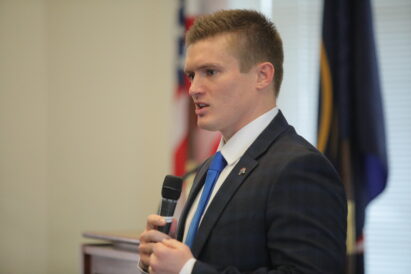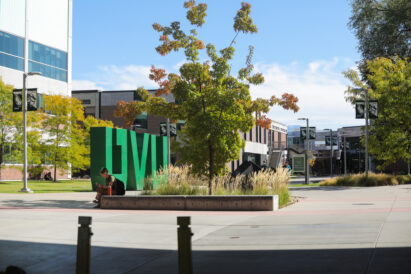Lawmakers introduce bills on bond referendums, requiring voter approval on property tax increases
- The Utah State Capitol building, pictured Feb. 18, 2022.
- Heidi Balderree, state senator for Utah District 22, stands near the Traverse Mountain Outlets in Lehi on Wednesday, Oct. 25, 2023.
- Tyler Clancy addresses delegates before the special election for District 60 in the Utah House of Representatives on Saturday, Jan. 14, 2023. The special election was held at the Provo City Library.

Ashtyn Asay, Daily Herald file photo
The Utah State Capitol building, pictured Feb. 18, 2022.
Sen. Heidi Balderree, R-Saratoga Springs, is proposing a bill that would extend the amount of time citizens have to collect signatures to place a revenue bond on the ballot.
The bill, Senate Bill 100, would give voters 45 days instead of just 30 days to gather the required amount of signatures to place a question on the ballot asking residents whether to issue a bond that is “payable solely from excise tax revenue.”
The legislation was discussed in the Senate Revenue and Taxation Committee on Wednesday afternoon, where it passed unanimously.
During committee, Balderree explained that current Utah law on voter referendums related to revenue bonds is in its own section addressing such bonds.
Her bill makes local referendums on revenue bonds payable through tax revenue subject to Utah code addressing “issues submitted to the voters.” This provides more detailed instructions on how many signatures need to be gathered and allows citizens 45 days to gather the signatures needed.

Carlene Coombs, Daily Herald
Heidi Balderree, state senator for Utah District 22, stands near the Traverse Mountain Outlets in Lehi on Wednesday, Oct. 25, 2023.
“This little section was kind of an island unto itself,” she told the committee. “And so in order to keep up with existing referenda statutes, I think it’s really important with this bill, what it will do today (is) it’ll help us to bring it into parity with similar code.”
Balderree said that as someone who was part of a referendum that didn’t pass, partly due to not having enough time, she’s “sympathetic to the cause.”
Rusty Cannon, representing the Utah Taxpayers Association, spoke in favor of the bill, saying it provides clarity in the code.
With the committee’s approval, Balderree’s bill will now go to the full Senate floor for consideration.
In the Utah House, Rep. Tyler Clancy is proposing a bill to require property tax increases during the “specified tax year” to automatically go to the citizens for a vote. The specified tax year is defined as 2024 through 2026 for a calendar year taxing entity and July 2024 through June 30, 2027, for a fiscal year taxing entity.

Harrison Epstein, Daily Herald file photo
Tyler Clancy addresses delegates before the special election for District 60 in the Utah House of Representatives on Saturday, Jan. 14, 2023. The special election was held at the Provo City Library.
Last year, Pleasant Grove voters gathered signatures to place a recently approved property tax increase on the ballot and, in November, voted against increasing property taxes. The city had approved the increase last August, intending to use the revenue for things like the new Cook Family Park and increased police wages.
Citizens in Spanish Fork attempted to place a tax increase on the ballot in 2022 but failed to collect enough signatures. Some of that tax increase will be used to fund a new recreation center in the city.
Last year, property taxes also were raised in Provo, Alpine School District and various other municipalities in the county. According to The Salt Lake Tribune, around 80 taxing entities across Utah held truth-in-taxation hearings last year to consider increasing property taxes.
On Friday, Clancy’s bill was sent to the House Revenue and Taxation Committee for review.






